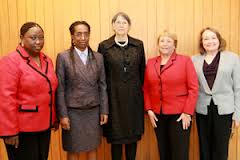No Peace Without Justice
In early October, President of the Special Court for Sierra Leone, Justice Shireen Avis Fisher and Registrar, Binta Mansaray, traveled to New York to share the important work of the court with the UN, member states and civil society.
 The Special Court for Sierra Leone is mandated to try those who bear the greatest responsibility for serious violations of international humanitarian law committed in Sierra Leone since 30 November 1996. The Special Court has set important precedents for gender justice in the international system, including the recognition of forced marriage as a crime against humanity, and Sexual and Gender Based Violence as a crime of terrorism.
The Special Court for Sierra Leone is mandated to try those who bear the greatest responsibility for serious violations of international humanitarian law committed in Sierra Leone since 30 November 1996. The Special Court has set important precedents for gender justice in the international system, including the recognition of forced marriage as a crime against humanity, and Sexual and Gender Based Violence as a crime of terrorism.
The court has also set new standards for gender sensitive approaches to participation in the justice process and witness protection for women and girl survivors of the conflict. Although the court has only tried a small number of those deemed to be most responsible, the court has prioritized localization of justice to ensure the courts decisions and actions do not remain remote to the people of Sierra Leone.
Traveling with a small generator, media equipment and taped summaries of the trials, the Outreach program has taken the work of the court to the people, and incorporated their needs and expectations of Sierra Leonians into the courts work. This broad participatory approach has been one of the greatest achievements of the court, and essential step towards ending impunity and bringing sustainable peace.
Concluding a small panel discussion attended by New York based NGO's, Justice Shireen reminded us that "there can be no peace without justice", and that we can all play a role in sharing the achievements of the Special Court for Sierra Leone with our networks, peers and colleagues, so that it's achievements in gender justice will influence global justice systems, and contribute to ending impunity.
